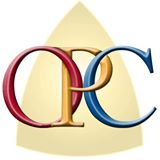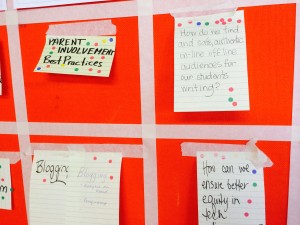 This week I had the pleasure of actively participating in two very different types of PD sessions. As part of building our mentorship program for TVDSB new administrators we came together as a planning team to examine our Connective Intelligence through a program offered by OPC. This experience allowed us to first know ourselves as individuals and secondly to know each other as members of the group. Through this process we were able to refine our problem of practice as it relates to creating a strong mentorship program for new administrators and begin to examine and build the program from its grassroots. As a leader in this mentor group I found myself asking the question why me? What skills and assets do I bring to the table that are needed to support new administrators? Through my participation in this workshop I was able to uncover what it is I bring to the table as well as the strengthens of my colleagues. We examined our dominant thinking styles and also our emotional thinking styles. We were all able to clearly analyze both our strengthens and areas of growth in both areas of connective intelligence. We were shown and given time to practice strategies that built on our strengthens and developed our weaknesses in our role of school leader. One of the key areas of learning for me was through the examination of the Ontario Leadership Framework. We examined all of the facets of our connective intelligence and how it related to the OLT. This process opened my eyes to my strengthens and areas of challenge as a school leader as it relates to the components of the OLF. I discovered that I am strong in Setting Directions and Building Relationships but need to work hard in the areas of Leading the Instructional Program as well as Securing Accountability. I can as a result of this process articulate more precisely what skills make me successful at those tasks and also whyI struggled in particular areas.
This week I had the pleasure of actively participating in two very different types of PD sessions. As part of building our mentorship program for TVDSB new administrators we came together as a planning team to examine our Connective Intelligence through a program offered by OPC. This experience allowed us to first know ourselves as individuals and secondly to know each other as members of the group. Through this process we were able to refine our problem of practice as it relates to creating a strong mentorship program for new administrators and begin to examine and build the program from its grassroots. As a leader in this mentor group I found myself asking the question why me? What skills and assets do I bring to the table that are needed to support new administrators? Through my participation in this workshop I was able to uncover what it is I bring to the table as well as the strengthens of my colleagues. We examined our dominant thinking styles and also our emotional thinking styles. We were all able to clearly analyze both our strengthens and areas of growth in both areas of connective intelligence. We were shown and given time to practice strategies that built on our strengthens and developed our weaknesses in our role of school leader. One of the key areas of learning for me was through the examination of the Ontario Leadership Framework. We examined all of the facets of our connective intelligence and how it related to the OLT. This process opened my eyes to my strengthens and areas of challenge as a school leader as it relates to the components of the OLF. I discovered that I am strong in Setting Directions and Building Relationships but need to work hard in the areas of Leading the Instructional Program as well as Securing Accountability. I can as a result of this process articulate more precisely what skills make me successful at those tasks and also whyI struggled in particular areas.
Why was this PD great?
It was engaging.
We had time to reflect throughout the process.
There was time built in for dialogue.
There was time to work individually, in pairs, in small and large groups.
We were able to develop a sense of trust and collegiality with the group.
The leaders of our group encouraged and modelled risk taking.
The facilitators followed our lead and did not press their own agenda. They allowed us to mild the experience to meet our unique needs.
It was based on thinking and application not knowledge.
It was applicable to what we do in both our personal and work lives.
It focused on growing our leadership skills.
I was also an organizer, facilitator and participant at Edcamp London. I had attended EdCamp Waterloo earlier this year to discover what it was all about. What was this movement and why was it picking up steam and gaining in popularity with educators around the world? Today was a powerful example of deep, authentic learning based on the interests and needs of the participants. The day began with participants sharing their ideas of what they wanted to discuss in the various sessions. Rich topics were suggested such as: Google Apps for Education, What Makes a Great Leader?, Assessment and Feedback, Assistive Technology for Spec Ed, S.O.L.E., Growth Mindset, Navigating Good Pedagogy and Traditional Classrooms, Inquiry Based Learning vs Accountability and the list goes on…..
Participants then had the chance to gather in rooms to talk. Edcamp organizers began the discussions and engaged as active participants. The dialogue was rich, meaningful and focused on the participants needs. There was no set agenda, no presenters and no formal structure. It was just a group of people interested in deepening their understanding and knowledge of topics of interest to THEM!
Why was this PD Great?
It was based on participants needs and interests.
It was authentic.
It allowed participants to engage in rich dialogue.
It was current.
It was fun.
It was meaningful.
Participants could move from session to session if they were not getting their needs met.
It was for everyone.
Bottom Line: Great PD has to meet the needs of the participants.

